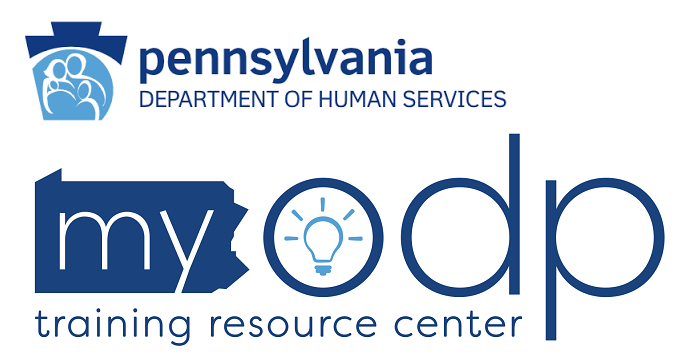Positive Approaches Journal, Volume 9, Issue 2
Westerfield | 86-94

Volume 9 ► Issue 2 ► 2020
Utilizing Effective Communication Across Teams to Support Successful Transition into the Community
Sarah E Westerfield, Ph.D
Introduction
It is not uncommon for individuals to have a challenging time transitioning from a Residential Treatment Facility (RTF) back into the community.1 Transitions can be difficult for many reasons including, but not limited to, change in or lack of structure, decreased supervision, and inconsistencies between environments. The following case study is one example of how the difficulties of transitions can be lessened through a well-developed transition plan, frequent collaboration, and the use of multidisciplinary teams to support an individual.
Everyday Lives: Values in Action2 is the foundation for policy and principles for individuals with disabilities in Pennsylvania. The basis of Everyday Lives lies in two statements: 1) We value what is important to people with disabilities and their families, who are striving for an everyday life, and 2) People with disabilities have a right to an everyday life that is no different than that of all other citizens. As challenges arise in various situations, how do we consistently ensure quality of life for individuals no matter the diagnosis and/or behavioral concerns? Individuals with dual diagnoses and/or behavior concerns can present unique challenges and may require additional support to maintain an Everyday Life. This case study will relay the chapter in the story of Joseph (pseudonym) who is Deaf and diagnosed with autism spectrum disorder (ASD).
Research estimates that as many as 3.5% of individuals diagnosed with autism spectrum disorder (ASD) are also Deaf or hard of hearing (DHH)3 This combination of diagnoses presents unique challenges, including finding providers who are prepared to support individuals with multiple disabilities. While there is almost no systematic research on the adaptation of evidence-based practices for individuals with ASD who also have hearing loss4 we can utilize best practices for behavior intervention and collaboration across teams to create the likelihood for success. Joseph’s story illustrates a successful transition into the community after an initial failed attempt and documents the imperative need for communication and collaboration across multi-disciplinary teams.
As a teenager, Joseph’s behaviors reached a point where it was difficult for the family to care for him in the home. In order to receive specialized care to address his needs, he entered a (RTF) that supported individuals with ASD who were also Deaf or hard of hearing (DHH). An RTF provides a highly structured, therapeutic environment, where intensive treatment plans can be implemented based on an individual’s needs. Joseph lived in the RTF for several years with great overall success. As Joseph neared adulthood, plans were made for him to transition to residential habilitation in the community.
Joseph transitioned into a single-person residential home that was run by a provider who specialized in working with Deaf individuals. He lived in this home for a short amount of time before he transferred to a new home with the same provider due to destructive behaviors and noise complaints by neighbors. The new home was larger and was also occupied by another individual who was also receiving services. Over the nine months stay with this provider, Joseph had eight psychiatric/behavioral hospitalizations and numerous trips to the emergency room. He engaged in aggressive, destructive, and self-injurious behaviors, and frequently called 911 to return to the hospital where Joseph reported he “felt safe”. It was often thought that Joseph felt more comfortable in a hospital setting due to the rules and structure that were put in place, like what he was used to from his prior RTF setting. Throughout this time the provider consulted with an independent behavior specialist on the case and multiple attempts were made to implement behavior change procedures. As behavior events continued to escalate, three separate events ended in criminal charges being filed.
Eventually the provider began to feel that they were unable to continue to safely support Joseph. When being admitted to the psychiatric hospital for the eighth time, a 45-day written notice was sent to the Office of Developmental Programs (ODP), informing of the decision to terminate their contract with Joseph. At this same time, the physician at the psychiatric facility prepared to discharge Joseph. However, the provider was unwilling to take him back due to past events, as well as staff feeling unsafe working with him. The Administrative Entity (AE) and the Supports Coordinator (SC) for Joseph’s case began contacting multiple providers in search of a team that could support Deaf individuals who also have complex behavioral needs. In addition, ODP was contacted for additional support in finding a placement for Joseph.
The SC and AE for the county contacted approximately 40 different providers during this time and all declined being able to support Joseph, many citing their inability to meet the needs of someone who is Deaf with intense behavioral needs. Without a provider to discharge to, the hospital administration filed a 406 petition for involuntary placement to a state center, a state-run intermediate care facility for individuals with intellectual disabilities (ICF/ID). Even though the physician agreed that Joseph could and should be supported in the community, the petition was filed because he could no longer qualify for acute care in a psychiatric facility.
Simultaneously, ODP assembled a multidisciplinary team to divert his entry to a state facility and find him a placement where he could experience success in the community. The team included an ODP Clinical Director, ODP Deaf Services Coordinator, the SC, the AE, Joseph’s psychiatrist, the hospital physician, the hospital behavioral team, Joseph’s current behavior specialist, the old provider, and, eventually, the new provider. Members of the team talked daily and met weekly developing Joseph’s profile for potential providers to ensure that all communication and behavioral needs could be addressed. The team noted the importance of three factors that were imperative for Joseph to be successful in a new residential placement, 1) access to effective communication, 2) a solid behavior plan, and 3) a structured daily plan.
Joseph’s ability to communicate effectively with those around him was essential. In addition to his need for fluent American Sign Language (ASL), the team became aware that Joseph had damaged his hearing aid and cochlear implant during a behavioral episode following his initial transition to the community. Not only did this affect his daily communication with others, this left him without the ability to communicate with his family via phone. The provider reported these devices had not been fixed for two reasons: 1) There had not been time due to his continual hospital admissions, and 2) it was thought that if the devices were repaired, Joseph would break them again. To the team, this explanation was unacceptable, and it was felt his lack of access to these devices was a contributor to current behavioral issues. Immediate advocacy for communication access began, including collaborating with a specialist for full repairs to Joseph’s assistive technology (hearing aid and cochlear implant). An individualized communication profile was developed for Joseph through the ODP Special Populations Unit, while previous technical assistance increased capacity for the new provider to support Deaf individuals in their homes.
Next a solid behavior plan was created, which was key for successful support of an individual with behavior concerns. The team identified all variables that could affect behavior and success for Joseph. This included the gathering of detailed information from past medical records including genetic consultation, as well as collaboration with the previous, successful residential placement. Joseph’s behavior specialist worked with the team and the new provider to review past information and was readily available and on call to answer questions and/or address issues or concerns. The behavior specialist trained all staff on the specifics of the updated plan and the provider worked hand in hand with the behavior specialist to implement the plan with fidelity. Data was consistently tracked and analyzed allowing the new team to determine if the current plan was working, or to adjust as necessary.
Finally, the team felt Joseph was asking for structure like what he had and known in the RTF setting. He was asking in a way that others were not hearing or understanding, as he often stated he wanted to be in the hospital where it felt safe. In order to provide this, the team felt it was important to go “back to the basics” of routine and structure, that are foundational when supporting an individual on the autism spectrum. This meant continuing to provide Joseph with autonomy and the ability to make life choices, while helping him to integrate structure into his day. This was accomplished through creating routines for daily activities (eg, meals, sleep), establishing rules and expectations across settings, and utilizing visual schedules.
Although Joseph had an initial struggle in his first community home, it was shown that he could be successful with multidisciplinary collaboration and the creation of an individualized transition and behavior plan. While his transition to this new placement was not without challenges, there has been overall success, including no hospitalizations or calls to 911. With collaboration and team-work Joseph is now starting to experience an everyday life in his community. Certainly, providers cannot be expected to have expertise in every specialized area, but it is possible to locate specialists and build a team to successfully support an individual. This case is an excellent example that through team collaboration and dedication, an individual who was once considered unsuccessful in the community can experience success with the right supports in place.
There are three key lessons to be learned from Joseph’s transition. First, providers must recognize the importance of communication access for individuals with disabilities. True access to communication includes access to assistive technology. Removing or limiting access to assistive technology should never be a consideration, especially given it is essential to quality of life. Doing so removes the individual’s agency and ability to communicate. Second, when behavioral issues are present it is imperative that a research-based behavior support plan is created and implemented with fidelity. Critical components of implementing a behavior plan include staff training, daily data collection to inform decision making, and ongoing team member discussions. Lastly, collaboration across teams is essential. Establishing and maintaining clear communication within the multidisciplinary team developed for Joseph ensured he had a successful transition. Joseph’s story is evidence of the true benefits of collaboration for supporting an individual with disabilities.
References
- Nickerson A, Colby SA, Brooks JL, Rickert JM, & Salamone FJ Transitioning youth from residential treatment to the community: A preliminary investigation. Child Youth Care Forum. 2007; 36: 73-86.
- Beer AN, McBoyle M, Kakande E, Dar Santos RC, & Koszak FK. Autism and peripheral hearing loss: A systematic review. Int. J. Pediatr. Otorhinolaryngol. 2014; 78(1): 96-101.
- Everyday Lives: Values in Action. Pennsylvania Department of Human Services, Office of Developmental Programs. 2016.
- Hansen S & Scott J. A systematic review of the autism research with children who are deaf or hard of hearing. Communication Disorders Quarterly. 2018; 39(2): 330-334.
Biography
Sarah Westerfield started with the Division of Program Administration in January of 2020 as the Western Regional Clinical Director. She received her Ph.D. from the University of Pittsburgh and her research focuses on family-professional partnerships as well as transition to adulthood for individuals with autism. Sarah has over 15-years of experience working with individuals with disabilities and their families. Formerly she has worked in early intervention through college transition, and as a special education teacher and supervisor.
Contact Information
Sarah E. Westerfield, Ph.D.
PA Department of Human Services
Office of Developmental Programs
Western Regional Office
Suite 490 Piatt Place, 301 Fifth Avenue
Pittsburgh, PA
(412)-880-0973




